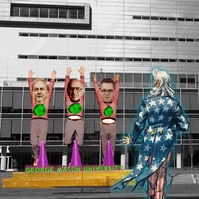After 40 years of rampant corporate crime, there's a new sheriff in town: Jonathan Kanter was appointed by Biden to run the DOJ's Antitrust Division, and he's overseen 170 "significant antitrust actions" in the past 2.5 years, culminating in a court case where Google was ruled to be an illegal monopolist:
https://pluralistic.net/2024/08/07/revealed-preferences/#extinguish-v-improve
Kanter's work is both extraordinary and par for the course. As Kanter said in a recent keynote for the Fordham Law Competition Law Institute's 51st Annual Conference on International Antitrust Law and Policy, we're witnessing an epochal, global resurgence of antitrust:
Kanter's incredible enforcement track record isn't just part of a national trend - his colleagues in the FTC, CFPB and other agencies have also been pursuing an antitrust agenda not seen in generations - but also a worldwide trend. Antitrust enforcers in Canada, the UK, the EU, South Korea, Australia, Japan and even China are all taking aim at smashing corporate monopolies. Not only are they racking up impressive victories against these giant corporations, they're stealing the companies' swagger. After all, the point of enforcement isn't just to punish wrongdoing, but also to deter wrongdoing by others.
Until recently, companies hurled themselves into illegal schemes (mergers, predatory pricing, tying, refusals to deal, etc) without fear or hesitation. Now, many of these habitual offenders are breaking the habit, giving up before they've even tried. Take Wiz, a startup that turned down Google's record-shattering $23b buyout offer, understanding that the attempt would draw more antitrust scrutiny than it was worth:
https://finance.yahoo.com/news/wiz-turns-down-23-billion-022926296.html
As welcome as this antitrust renaissance is, it prompts an important question: why didn't we enforce antitrust law for the 40 years between Reagan and Biden?
That's what Kanter addresses the majority of his remarks to. The short answer is: crooked academic economists took bribes from monopolists and would-be monopolists to falsify their research on the impacts of monopolists, and made millions (literally - one guy made over $100m at this) testifying that monopolies were good and efficient.
After all, governments aren't just there to enforce rules - they have to make the rules first, and do to that, they need to understand how the world works, so they can understand how to fix the places where it's broken. That's where experts come in, filling regulators' dockets and juries' ears with truthful, factual testimony about their research. Experts can still be wrong, of course, but when the system works well, they're only wrong by accident.
The system doesn't work well. Back in the 1950s, the tobacco industry was threatened by the growing scientific consensus that smoking caused cancer. Industry scientists confirmed this finding. In response, the industry paid statisticians, doctors and scientists to produce deceptive research reports and testimony about the tobacco/cancer link.
The point of this work wasn't to make necessarily to convince people that tobacco was safe - rather, it was to create the sense that the safety of tobacco was a fundamentally unanswerable question. "Experts disagree," and you're not qualified to figure out who's right and who's wrong, so just stop trying to figure it out and light up.
In other words, Big Tobacco's cancer denial playbook wasn't so much an attack on "the truth" as it was an attack on epistemology - the system by which we figure out what is true and what isn't. The tactic was devastatingly effective. Not only did it allow the tobacco giants to kill millions of people with impunity, it allowed them to reap billions of dollars by doing so.
Since then, epistemology has been under sustained assault. By the 1970s, Big Oil knew that its products would render the Earth unfit for human habitation, and they hired the same companies that had abetted Big Tobacco's mass murder to provide cover for their own slow-motion, planetary scale killing spree.
Time and again, big business has used assaults on epistemology to provide cover for unthinkable crimes. This has given rise to today's epistemological crisis, in which we don't merely disagree about what is true, but (far more importantly) disagree about how the truth can be known:
https://pluralistic.net/2024/03/25/black-boxes/#when-you-know-you-know
Ask a conspiratorialist why they believe in Qanon or Hatians in Springfield eating pets, and you'll get an extremely vibes-based answer - fundamentally, they believe it because it feels true. As the old saying goes, you can't reason someone out of a belief they didn't reason their way into.
This assault on reason itself is at the core of Kanter's critique. He starts off by listing three cases in which academic economists allowed themselves to be corrupted by the monopolies they studied:
i. George Mason University tricked an international antitrust enforcer into attending a training seminar that they believed to be affiliated with the US government. It was actually sponsored by the very companies that enforcer was scrutnizing, and featured a parade of "experts" who asserted that these companies were great, actually.
ii. An academic from GMU - which receives substantial tech industry funding - signed an amicus brief opposing an enforcement action against their funders. The academic also presented a defense of these funders to the OECD, all while posing as a neutral academic and not disclosing their funding sources.
iii. An ex-GMU economist, Kanter, submitted a study defending Qualcomm against the FTC, without disclosing that he'd been paid to do so. Wright has elevated undisclosed conflicts of interest to an art form:
https://www.wsj.com/us-news/law/google-lawyer-secret-weapon-joshua-wright-c98d5a31
Kanter is at pains to point out that these three examples aren't exception. The economics profession - whose core tenet is "incentive matter" - has made it standard practice for individual researchers and their academic institutions to take massive sums from giant corporations. Incredibly, they insist that this has nothing to do with their support of monopolies as "efficient."
Academic centers often serve as money-laundries for monopolist funders; researchers can evade disclosure requirements when they publish in journals or testify in court, saying only that they work for some esteemed university, without noting that the university is utterly dependent on money from the companies they're defending.
Now, Kanter is a lawyer, not an academic, and that means that his job is to advocate for positions, and he's at pains to say that he's got nothing but respect for ideological advocacy. What he's objecting to is partisan advocacy dressed up as impartial expertise.
For Kanter, mixing advocacy with expertise doesn't create expert advocacy - it obliterates expertise, as least when it comes to making good policy. This mixing has created a "crisis of expertise...a pervasive breakdown in the distinction between expertise and advocacy in competition policy."
The point of an independent academia, enshrined in the American Association of University Professors' charter, is to "advance knowledge by the unrestricted research and unfettered discussion of impartial investigators." We need an independent academy, because "to be of use to the legislator or the administrator, [an academic] must enjoy their complete confidence in the disinterestedness of [his or her] conclusions."
It's hard to overstate just how much money economists can make by defending monopolies. Writing for The American Prospect, Robert Kuttner gives the rate at $1,000/hour. Monopoly's top defenders make unimaginable sums, like U Chicago's Dennis Carlton, who's brought in over $100m in consulting fees.:
https://prospect.org/economy/2024-09-24-economists-as-apologists/
The hidden cost of all of this is epistemological consensus. As Tim Harford writes in his 2021 book The Data Detective, the truth can be known through research and peer-review:
https://pluralistic.net/2021/01/04/how-to-truth/#harford
But when experts deliberately seek to undermine the idea of expertise, they cast laypeople into an epistemological void. We know these questions are important, but we can't trust our corrupted expert institutions. That leaves us with urgent questions - and no answers. That's a terrifying state to be in, and it makes you easy pickings for authoritarian grifters and conspiratorial swindlers.
Seen in this light, Kanter's antitrust work is even more important. In attacking corporate power itself, he is going after the machine that funds this nihilism-inducing corruption machine.
This work – excluding any serialized fiction – is licensed under a Creative Commons Attribution 4.0 license. That means you can use it any way you like, including commercially, provided that you attribute it to me, Cory Doctorow, and include a link to pluralistic.net.
https://creativecommons.org/licenses/by/4.0/
Quotations and images are not included in this license; they are included either under a limitation or exception to copyright, or on the basis of a separate license. Please exercise caution.







Jump in the discussion.
No email address required.
Officially being told by people in charge that you can not, in fact, trust the science. And that's not even taking into account the replication crisis in academia or the corruption in peer review.
Fortunately, you pretty much can never go wrong distrusting corporations. Unfortunately, they're the main source of nearly all information.
Jump in the discussion.
No email address required.
More options
Context
Snapshots:
https://pluralistic.net/2024/09/25/epistemological-chaos/:
ghostarchive.org
archive.org
archive.ph (click to archive)
https://pluralistic.net/2024/08/07/revealed-preferences/#extinguish-v-improve:
ghostarchive.org
archive.org
archive.ph (click to archive)
https://www.justice.gov/opa/speech/assistant-attorney-general-jonathan-kanter-delivers-remarks-fordham-competition-law-0:
ghostarchive.org
archive.org
archive.ph (click to archive)
https://finance.yahoo.com/news/wiz-turns-down-23-billion-022926296.html:
ghostarchive.org
archive.org
archive.ph (click to archive)
https://pluralistic.net/2024/03/25/black-boxes/#when-you-know-you-know:
ghostarchive.org
archive.org
archive.ph (click to archive)
https://www.wsj.com/us-news/law/google-lawyer-secret-weapon-joshua-wright-c98d5a31:
ghostarchive.org
archive.org
archive.ph (click to archive)
https://prospect.org/economy/2024-09-24-economists-as-apologists/:
ghostarchive.org
archive.org
archive.ph (click to archive)
https://pluralistic.net/2021/01/04/how-to-truth/#harford:
ghostarchive.org
archive.org
archive.ph (click to archive)
pluralistic.net:
ghostarchive.org
archive.org
archive.ph (click to archive)
https://creativecommons.org/licenses/by/4.0/:
ghostarchive.org
archive.org
archive.ph (click to archive)
Jump in the discussion.
No email address required.
More options
Context